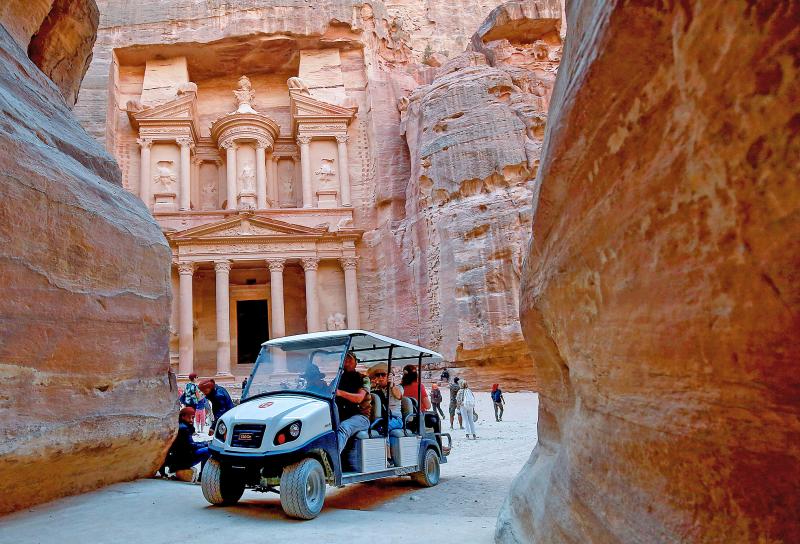Horses and mules have long drawn tourist carriages through Jordan’s ancient city of Petra, but animal rights concerns are driving a project to start replacing them with electric vehicles.
A small fleet of 10 rechargeable e-carts take visitors through the rose-colored Siq, or gorge, leading to the famed capital of the Nabateans, which dates back to the first century BC.
“There is no pollution or smoke” and the change has “reduced the cases of animal mistreatment,” Petra Development and Tourism Regional Authority Chief Commissioner Suleiman Farajat said.

Photo: AFP
The golf buggy-style vehicles have less impact because “sometimes the carriage wheels hit the sides of the Siq ... the horse dung caused a bad smell in the place and cleaning it was not easy, Farajat said.
“It was an unpleasant experience for the tourists, the horses and us,” Farajat added.
Animal rights group PETA, which had criticized the use of the often scrawny and overworked draft animals, has described the project as a “major first step to protect working animals.”
The group hailed the “game-changing vehicles” and added that it hopes to work with officials “toward the day when there will be only animal-free transportation at Petra.”
For now, the Petra authority said that it would keep some of the horses “to preserve the character of the place, as it is a world heritage site.”
However, the change has also been hailed for another reason — helping to make the UNESCO World Heritage Site more accessible to older and disabled visitors.
Austrian tourist Rudy, 43, who uses a wheelchair, said he had repeatedly postponed a visit because of the COVID-19 pandemic, and was now “very happy” to have made the trip.
“Disabled people, but also people who have difficulty walking for a long distance ... now have a chance to see this amazing place,” Rudy said.
“It seems a little bit out of character to have these in a beautiful place like this, but at our age, it was nice to come back in an electric cart,” a US tourist named Angie, 60, added.
Jordan’s tourism industry is recovering from the blow of COVID-19, having previously relied on it for more than 10 percent of its GDP. The pandemic slashed revenues from US$5.8 billion in 2019 to US$1 billion last year.
Petra, Jordan’s most famous tourism site, provides a living for hundreds of families.
The move to replace 12 horse-drawn carriages with 10 e-carts was agreed with the horse owners’ association.
Foreign tourists pay 25 dinars (US$35.25) and Jordanians 15 dinars for the round trip from the visitor center to the archeological site.
The association receives 75 percent of the income, while 25 percent goes to the authority, Farajat said.
Association head Mohammad Amarat said that those operating the electric carts earn more than 300 dinars per month as the carts can carry five passengers, compared with just two in the horse-drawn carriages.
Amarat said that he prefers the new vehicles because previously the horses “were tired, their income was less, and the journey time was longer.”

The death of a former head of China’s one-child policy has been met not by tributes, but by castigation of the abandoned policy on social media this week. State media praised Peng Peiyun (彭珮雲), former head of China’s National Family Planning Commission from 1988 to 1998, as “an outstanding leader” in her work related to women and children. The reaction on Chinese social media to Peng’s death in Beijing on Sunday, just shy of her 96th birthday, was less positive. “Those children who were lost, naked, are waiting for you over there” in the afterlife, one person posted on China’s Sina Weibo platform. China’s

‘POLITICAL LOYALTY’: The move breaks with decades of precedent among US administrations, which have tended to leave career ambassadors in their posts US President Donald Trump’s administration has ordered dozens of US ambassadors to step down, people familiar with the matter said, a precedent-breaking recall that would leave embassies abroad without US Senate-confirmed leadership. The envoys, career diplomats who were almost all named to their jobs under former US president Joe Biden, were told over the phone in the past few days they needed to depart in the next few weeks, the people said. They would not be fired, but finding new roles would be a challenge given that many are far along in their careers and opportunities for senior diplomats can

‘NO COUNTRY BUMPKIN’: The judge rejected arguments that former prime minister Najib Razak was an unwitting victim, saying Najib took steps to protect his position Imprisoned former Malaysian prime minister Najib Razak was yesterday convicted, following a corruption trial tied to multibillion-dollar looting of the 1Malaysia Development Berhad (1MDB) state investment fund. The nation’s high court found Najib, 72, guilty on four counts of abuse of power and 21 charges of money laundering related to more than US$700 million channeled into his personal bank accounts from the 1MDB fund. Najib denied any wrongdoing, and maintained the funds were a political donation from Saudi Arabia and that he had been misled by rogue financiers led by businessman Low Taek Jho. Low, thought to be the scandal’s mastermind, remains

Australian Prime Minister Anthony Albanese yesterday announced plans for a national bravery award to recognize civilians and first responders who confronted “the worst of evil” during an anti-Semitic terror attack that left 15 dead and has cast a heavy shadow over the nation’s holiday season. Albanese said he plans to establish a special honors system for those who placed themselves in harm’s way to help during the attack on a beachside Hanukkah celebration, like Ahmed al-Ahmed, a Syrian-Australian Muslim who disarmed one of the assailants before being wounded himself. Sajid Akram, who was killed by police during the Dec. 14 attack, and